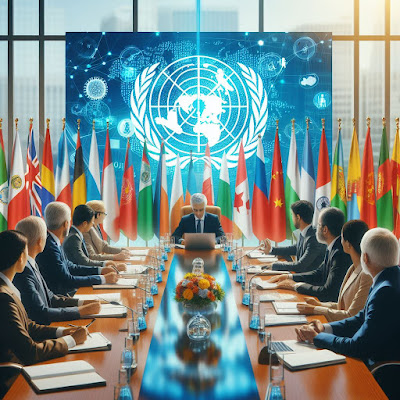Introduction:
In an increasingly interconnected world, health challenges transcend borders, underscoring the need for collaborative efforts and diplomatic engagement to address global health issues effectively. Global Health Diplomacy (GHD) emerges as a vital framework for navigating the complex landscape of international health governance, cooperation, and diplomacy. From pandemic preparedness and infectious disease control to health equity and access to essential medicines, GHD plays a pivotal role in shaping policies, fostering partnerships, and promoting health security worldwide. In this comprehensive guide, we'll delve into the concept of Global Health Diplomacy, explore its key principles and practices, and examine its transformative impact on global health outcomes.
 |
| Global Health Diplomacy |
Understanding Global Health Diplomacy:
Global Health Diplomacy (GHD) refers to the strategic use of diplomatic tools and mechanisms to advance health objectives and address global health challenges.
It encompasses a wide range of activities, including negotiation, advocacy, capacity-building, and coalition-building, aimed at promoting health equity, strengthening health systems, and improving health outcomes for all. GHD operates at the intersection of health, foreign policy, trade, security, and development, recognizing the interconnectedness of health with broader political, social, and economic factors.Key Principles of Global Health Diplomacy:
Multisectoral Collaboration: GHD emphasizes the importance of engaging multiple sectors and stakeholders, including governments, international organizations, civil society, academia, and the private sector, in addressing complex health issues. By fostering collaboration and coordination across diverse actors, GHD facilitates the development of comprehensive and integrated approaches to global health challenges.
Equity and Social Justice: Equity and social justice are fundamental principles of GHD, guiding efforts to address health disparities and inequities within and between countries. GHD advocates for policies and interventions that prioritize the needs of vulnerable and marginalized populations, promote universal health coverage, and ensure access to essential health services and commodities for all individuals, regardless of their socioeconomic status or geographic location.
Evidence-Based Decision-Making: GHD relies on evidence-based decision-making to inform policy development, program implementation, and resource allocation. By synthesizing scientific evidence, epidemiological data, and best practices, GHD helps policymakers and practitioners make informed choices about health priorities, interventions, and investments, maximizing the impact and efficiency of global health efforts.
Diplomatic Engagement: Diplomatic engagement is a core component of GHD, involving dialogue, negotiation, and consensus-building among governments and other stakeholders to address shared health challenges. GHD diplomats work to build trust, foster relationships, and bridge differences, facilitating cooperation and solidarity in pursuit of common health goals.
Practices and Approaches in Global Health Diplomacy:
Health Diplomacy: Health diplomacy focuses specifically on using diplomatic channels and strategies to address health issues and promote health-related goals in the international arena. This includes bilateral and multilateral negotiations, diplomatic missions and exchanges, and participation in international health forums and organizations, such as the World Health Organization (WHO) and the United Nations (UN).
Vaccine Diplomacy: Vaccine diplomacy involves the use of vaccines as a tool for promoting health, building relationships, and exerting influence on the global stage. Countries and organizations may engage in vaccine diplomacy through the donation, distribution, or sharing of vaccines with other countries, particularly in times of crisis or during public health emergencies such as pandemics.
Trade and Health: Trade policies and agreements have significant implications for global health, affecting access to essential medicines, intellectual property rights, and the affordability of healthcare. GHD engages in trade negotiations and advocacy efforts to promote policies that support access to affordable medicines, facilitate technology transfer, and protect public health interests.
Global Health Governance: Global health governance refers to the structures, processes, and institutions responsible for coordinating and managing global health initiatives. GHD advocates for stronger and more inclusive global health governance frameworks that promote transparency, accountability, and equity, ensuring that health priorities are effectively addressed at the global level.
Impact and Challenges of Global Health Diplomacy:
Impact: Global Health Diplomacy has made significant contributions to improving health outcomes and advancing health equity worldwide. From the eradication of smallpox to the control of infectious diseases such as HIV/AIDS, malaria, and polio, GHD has played a pivotal role in shaping global health policy and practice, saving millions of lives and promoting human development.
Challenges: Despite its successes, GHD faces numerous challenges, including political tensions, resource constraints, and competing interests among stakeholders. Diplomatic efforts may be hindered by geopolitical rivalries, lack of political will, and divergent priorities, impeding progress on shared health goals and undermining global health security.
Conclusion:
Global Health Diplomacy is a powerful tool for addressing global health challenges and promoting health equity and security worldwide. By fostering collaboration, promoting equity, and leveraging diplomatic engagement, GHD has the potential to transform health systems, strengthen resilience, and build a healthier, more prosperous world for future generations. As we navigate the complexities of the global health landscape, let us embrace the principles and practices of Global Health Diplomacy, working together to create a world where health is a fundamental human right and a shared global priority.







